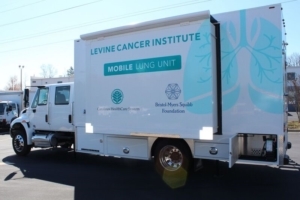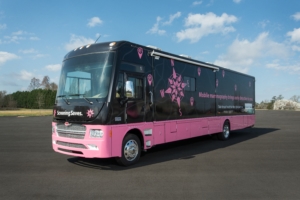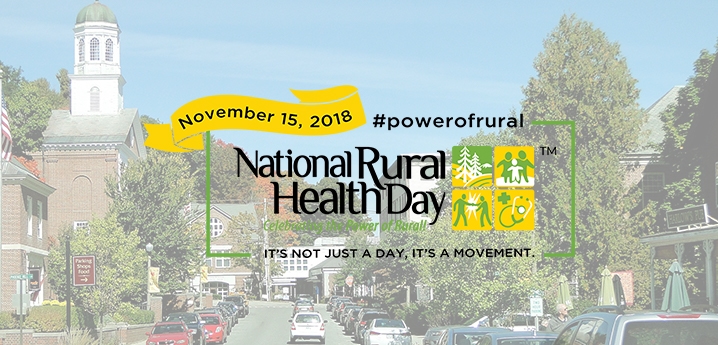In rural America, where nearly 60 million Americans live and work, you’ll find picturesque Main Streets, experience close-knit communities and take part in treasured traditions. These communities are at the very core of what makes our nation great, yet 1 in 5 of the hardworking Americans who live in remote areas struggle to access quality and affordable healthcare. Rural communities face many health-related challenges, including limited access to regular provider visits, higher rates of tobacco use, insufficient awareness and access to mental health care, and more. These difficulties are especially prevalent in North Carolina, which is the second most rural state in the nation with more than half of its 100 counties falling in that category. Each year, the third Thursday in November is dedicated to celebrating the unique and valuable attributes of rural communities and considering the health-related challenges in these areas.
Atrium Health realizes the critical need to keep our rural communities healthy and has taken action, implementing a number of rural health initiatives supported by philanthropy such as: Perfect Care: Personalized Cardiac Care and Collaborative, funded by a $1.1 million grant from the Duke Endowment; a mobile CT unit known as the “Lung Bus” which provides lung and oral cancer screenings to patients throughout the Carolinas; Project PINK and Project PINK Plus which provide free mammography screenings for uninsured women; and the Rural Dementia Care Program, made possible by a $400,000 grant from the Duke Endowment.
Perfect Care — implemented by Atrium Health’s Sanger Heart & Vascular Institute — aims to improve patient access to care and education, as well as eliminate disparities in follow-up cardiac care after surgery. The goal of the program is to allow cardiovascular patients to connect with their doctor without leaving their home, which otherwise can be challenging for those patients who live in rural areas. The program employs remote monitoring, known as “telemonitoring,” which allows providers to use webcams to conduct check-ups with their patients. Perfect Care is the only integrative cardiovascular care model of its kind in the country.
 Similarly, patients throughout the Carolinas can receive low-radiation screening for lung cancer via a mobile CT unit known as the “Lung Bus” (left). Made possible by support from the Bristol-Myers Squibb Foundation and partnership between Bristol-Myers Squibb, Samsung and Frazer, the Lung Bus allows patients to be screened for lung cancer without having to travel to the nearest hospital. Early screening often leads to early detection, which is known to increase survival rates for cancer.
Similarly, patients throughout the Carolinas can receive low-radiation screening for lung cancer via a mobile CT unit known as the “Lung Bus” (left). Made possible by support from the Bristol-Myers Squibb Foundation and partnership between Bristol-Myers Squibb, Samsung and Frazer, the Lung Bus allows patients to be screened for lung cancer without having to travel to the nearest hospital. Early screening often leads to early detection, which is known to increase survival rates for cancer.
This year, the Lung Bus has provided screenings for more than 400 patients in 9 counties – including Mecklenburg, Union, Cabarrus, Anson, Stanly, Lincoln, Cleveland, Rutherford, and Burke – with planned expansion to additional counties in 2019.
 In 2011, Levine Cancer Institute partnered with Charlotte Radiology to create Project PINK and Project PINK Plus – one of the largest, most comprehensive breast cancer detection and breast health education programs for uninsured women. Project PINK offers mobile access to breast care for women in Anson, Cleveland, Mecklenburg, Stanly, and Union counties. Project PINK Plus goes further to address the unique needs of women in these counties with pre-existing symptoms like palpable lumps, discharge, or breast dimpling. This year, over 900 women were provided free screening mammograms via Project PINK and Project PINK Plus, resulting in 13 identified cases of breast cancer, thanks to community donations that make the program possible.
In 2011, Levine Cancer Institute partnered with Charlotte Radiology to create Project PINK and Project PINK Plus – one of the largest, most comprehensive breast cancer detection and breast health education programs for uninsured women. Project PINK offers mobile access to breast care for women in Anson, Cleveland, Mecklenburg, Stanly, and Union counties. Project PINK Plus goes further to address the unique needs of women in these counties with pre-existing symptoms like palpable lumps, discharge, or breast dimpling. This year, over 900 women were provided free screening mammograms via Project PINK and Project PINK Plus, resulting in 13 identified cases of breast cancer, thanks to community donations that make the program possible.
Beyond cancer screenings, the Rural Dementia Care Program at CMC-University will provide virtual assessment and navigation services to dementia patients and families at primary care offices in Stanly, Anson, and Cleveland counties.
To learn more about supporting Atrium Health’s community health initiatives, visit AtriumHealthFoundation.org or the Community Health page.

